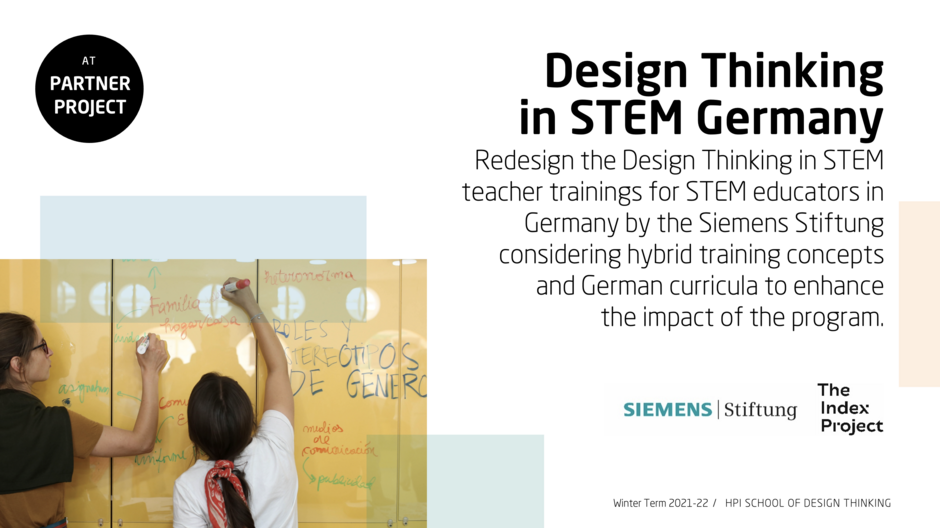Promoting creativity in science teaching: the Design Thinking in STEM project gets underway in Germany
The innovative design thinking approach can be applied in various areas of life, such as society, economy, and politics, to promote problem-solving skills, collaboration, and critical thinking. Within the Design Thinking in STEM project, HPI D-School, in cooperation with the Siemens Foundation, aims to bring about the necessary cultural change in education, especially in the science subjects of German schools. Since November, HPI D-School students have been developing training concepts for educators, which will be presented in February 2022.
As part of the current Advanced Track program, an interdisciplinary team of students is working on the question of how to combine the concept of Design Thinking in STEM with the skills targets in science curriculums, while also tailoring it to meet teachers’ needs. In order to remain close to the practical realities of everyday school life, the focus is primarily on working closely with the target group of educators.
The application of the future-oriented educational approach Design Thinking in schools promises advantages for both students and teachers in everyday learning and teaching. The aim of the project is to systematically integrate the teaching and learning method of design thinking into science lessons in order to use this approach to promote creative problem-solving skills in an even more targeted way and to strengthen innovation skills, collaboration and critical thinking. With a thematic framework based on the Sustainable Development Goals (SDGs) of the United Nations, a local reference to global challenges can be established and problems such as drinking water shortages or sustainable power generation can be addressed.
“Integrating design thinking in science teaching in Germany is a fascinating challenge, both for the student team and for the D-School,” said Professor Ulrich Weinberg, Director of the HPI School of Design Thinking. “Unfortunately, students all too often learn to compete with one another, develop sharp elbows and strive to be better than their peers. At the D-School, however, we have seen that complex problems can be solved more enjoyably, quickly and effectively when people contribute their diverse expertise and work together in a team.”
Design Thinking in STEM has been pursued by the Siemens Stiftung for some time. In 2019, the project was launched together with the Danish organisation The Index Project in South Africa. In collaboration with local experts, a comprehensive program of analog and digital training sessions for educators in Africa and Latin America has been developed, with an additional train-the-trainer program added in the middle of this year.
The HPI D-School is looking forward to adapting the project for the German educational concept and presenting it in February 2022. The student team is developing a hybrid education concept that combines virtual with on-site collaborative work and is complemented by free Open Educational Resources.
Dr. Nina Smidt, Managing Director and Spokesperson of the Board of Directors at Siemens Stiftung: “It is only together that we can overcome the complex challenges of our times. That goes for promoting teamwork and innovation skills in schools, as well as our cooperations with partners in the context of project development. We are particularly pleased to have such an innovative educational institution by our side in the HPI D-School, which teaches design thinking and follows a collaborative mindset.”

